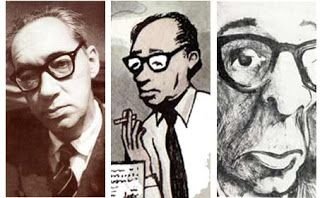Dear friends, it's been a while since my last Critical Notes, so it's time to publish another one. Play number 17, and I thought it was a good idea to dedicate it to a particular aspect of Juan Carlos Onetti's La vida breve (1950). My dear Onetti, one of my favorite writers.
His name was Juan Carlos Onetti Borges (and yes, he was related to the famous Argentine writer Jorge Luis Borges, for whom he felt, according to some antipathy). He was born in Montevideo, Uruguay, on July 1, 1909 and died in Madrid on May 30, 1994.
He is considered a "preboom" writer. He did not win the Nobel Prize, but his influence on the most contemporary Latin American literature is as if he were a winner of the legendary prize or as if he were an author of the Latin American "Boom". His first book published was El pozo, in 1939. It was the beginning of one of the deepest and most magnificent literary careers, which would reach its peak with the set of works grouped by critics under the label "Ciclo de Santa María", which began with the publication of La vida breve, a work that I deal with today.
If you have the opportunity, I recommend with devotion that you read it. It will mark their lives.
You can see a biography of Onetti
here.
Well, I will also introduce a variation on the format I have been handling so far: I will translate these Notes into English. As I do here. I hope that more people will be able to read them.
I am grateful.


Critical Note 17. Grammatical person and division of self in La vida breve, by Juan Carlos Onetti
Juan María Brausen, exhausted by vital failure (loving, labor, scriptural, etc.), creates two vicarious lives: that of Díaz Grey, a provincial doctor who traffics morphine on a small scale; and Arce, a cruel man turned lover of a prostitute. This operation drags into his life at least two important consequences. With Díaz Grey he maintains the author's relationship with his character (while writing a film script), and later, when he is no longer able to write, that of a demiurge from whom his creation becomes independent until he comes to know the existence of his creator, and therefore his quality as a product of provident intelligence. With Arce the relationship is, if you like, more complex, since this is a split executed at the same level of reality as Brausen and ends in the total and voluntary annulment of the consciousness of the latter to allow the full existence of the former. The final sequence of the novel situates Brausen (and definitely Arce) in Santa María, a province imagined by Brausen for Díaz Grey, and Díaz Grey outside Santa María.
Throughout the story, whose narration is assumed fundamentally from the homodiegesis (with predominance of autodiegesis), we observe the enunciating self, explicitly identified from the beginning of the story with Brausen, becoming himself the object of his discourse. This circumstance would be perfectly logical in a merely informative enunciation, in which a subject can enunciate from the "I" and, at the same time, refer to himself as the object of the enunciation, using formulas that refer to the first person. But in the novel we are commenting on, this circumstance becomes a significant element of importance, since this operation moves from its significance in the plane of the statement, where Brausen is stated as a third person, to a literal split for the enunciating character, in varying degrees of distance from the self. Let us point out some revealing phrases of this condition:
*It was the time of waiting, of infertility and confusion; everything was confused (...) and without a Brausen to assess, even if a Maple that imposed the order and the sense (188). *I, the bridge between Brausen and Arce, needed to be alone, I understood that isolation was essential for me to be born again, that only alone, without will or impatience, could I become and recognize myself. (188) *I was reserving of an indefinite degradation to the Brausen of all the life, I let it conclude to save it, I dissolved myself to allow the birth of Maple. (190) *I, you, he," I ratified, "Who is Brausen? The man who married Gertrude (241) *I was thinking about Juan María Brausen, I was joining slippery images to reconstruct it, I felt it close, kind and incomprehensible, I remembered that the same had felt of my father. (274)The appreciations of the 'I' on its process of splitting ride the enunciating consciousness in degrees of distancing that go from the simulation of the cosmogonic narrative, the transition and the bridge towards the object of discourse and, finally, the establishment of this object in opposition to enunciation. It is in this way that Brausen becomes an object of narration (third person) separated from the enunciating I, who, paradoxically, can be no other than Brausen. An impossible but represented distance is opened between the subject of the enunciation and the subject of the enunciation that collaborates, from the textual dimension, with the rupture of the limits between reality and fiction, the fundamental theme of the novel, which turns it into a metafictional story. So, as the previous analysis shows, spatial effects produced by the manipulation of enunciation can be exploited by narrative representation. The consequences of such an exercise concern lexical-grammatical units that are in charge of the spatial-temporal location of the subjectivities involved in the act of enunciation, although combinations of structures elaborated within the statements can also lead to the mentioned effect. It should be noted that in the subsequent exhibition these elements will be taken as their reference value for broader and more complex realizations that may arise in particular situations.
Source

Onetti, Juan Carlos (19509. La vida breve. Sudamericana. Buenos Aires.






Posted from my blog with SteemPress : http://adncabrera.vornix.blog/2019/03/17/critical-note-17-grammatical-person-and-division-of-self/
![[Portada] La vida breve](https://steemitimages.com/640x0/https://cvc.cervantes.es/img/onetti/obra_vida_600.jpg)